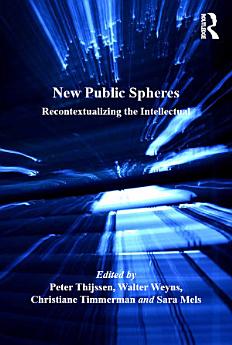New Public Spheres: Recontextualizing the Intellectual
Peter Thijssen · Walter Weyns · Sara Mels
Apr 2016 · Routledge
E-Book
234
Seiten
family_home
Zulässig
info
reportBewertungen und Rezensionen werden nicht geprüft Weitere Informationen
Über dieses E-Book
The public sphere provides a domain of social life in which public opinion is expressed by means of rational discourse and debate. Habermas linked its historical development to the coffee houses and journals in England, Parisian salons and German reading clubs. He described it as a bourgeois public sphere, where private people come together and where they turn from a politically disempowered bourgeoisie into an effective political agent - the public intellectual. With communication networks being diversified and expanded over time, the worldwide web has put pressure on traditional public spheres. These new informal and horizontal networks shaped by the internet create new contexts in which an anonymous and dispersed public may gather in political e-communities to reflect critically on societal issues. These de-centered modes of communication and influence-seeking change the role of the (traditional) public intellectual and - at first sight - seem to make their contributions less influential. What processes, therefore, influence changes within public spheres and how can intellectuals assert authority within them? Should we speak of different types of intellectuals, according to the different modes of public intellectual engagement? This ground-breaking volume gives a multi-disciplinary account of the way in which public intellectuals have constructed their role and position in the public sphere in the past, and how they try to voice public concerns and achieve authority again within those fragmented public spheres today.
Autoren-Profil
Peter Thijssen is Professor of Political Science at the University of Antwerp, Belgium. Walter Weyns is Professor of Sociology at the University of Antwerp, Belgium. Christiane Timmerman is Director, CeMIS (Centre for Migration and Intercultural Studies) at the University of Antwerp, Belgium. Sara Mels, University Centre Saint Ignatius Antwerp, Belgium.
Dieses E-Book bewerten
Deine Meinung ist gefragt!
Informationen zum Lesen
Smartphones und Tablets
Nachdem du die Google Play Bücher App für Android und iPad/iPhone installiert hast, wird diese automatisch mit deinem Konto synchronisiert, sodass du auch unterwegs online und offline lesen kannst.
Laptops und Computer
Im Webbrowser auf deinem Computer kannst du dir Hörbucher anhören, die du bei Google Play gekauft hast.
E-Reader und andere Geräte
Wenn du Bücher auf E-Ink-Geräten lesen möchtest, beispielsweise auf einem Kobo eReader, lade eine Datei herunter und übertrage sie auf dein Gerät. Eine ausführliche Anleitung zum Übertragen der Dateien auf unterstützte E-Reader findest du in der Hilfe.





